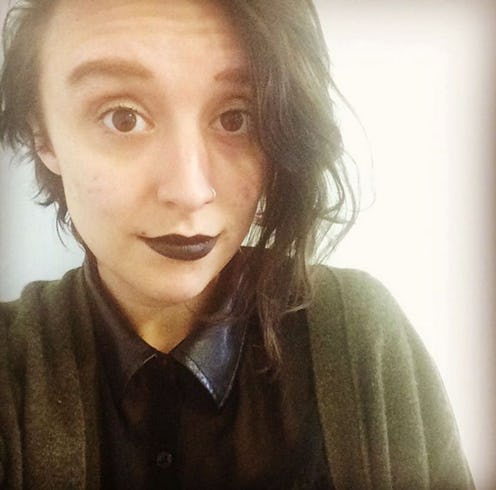Fashion
How Loose-Fitting Clothing Is Body Pos For Me

In my earlier years, restrictive guidelines about dressing used to dwell at the back of my mind whenever I shopped or put together an outfit. It's likely why some of my personal preferences regarding fashion were governed by so-called fashion rules regarding what's "flattering," which I would only later learn were rooted in obsolete nothingness. It took me a long time to come to terms with the fact that my proclivity for looser-fitting clothing could be body positive.
When I was younger, I loved trying on my dad's clothes and the garments of my masculine friends. I felt endlessly cool in their outfits — something I hadn't realized was due to my fluid gender identity. Usually, however, these large clothes wouldn't hug my natural shape or fit me "properly," something that friends and family would point out as "unflattering" for my petite frame. Forever obsessed with what others thought of me and of the construct of "dressing for my figure," I took these comments very seriously.
In retrospect, I gravitated towards these looser-fitting clothes because I perceived them to be masculine; a vibe that made me feel cool and at home in my body. Regardless, I tried my best to swap out my baggy tees for something more curve-hugging and "ladylike," a term my father used with me constantly that made me want to gag. I loved my masc outfits, but body image issues always won out.
I didn't always recognize looser-fitting clothes as something that could be body positive. As with most people, my relationship with my body was constantly changing as I grew up and my worldview and my understanding of myself expanded and broadened. My body negativity was at its peak in middle school, something I'm sure I'm not alone in, as I was as equally confused about my pubescent form as I was embarrassed of my jiggly belly.
In the back of my mind, I was aware that I had poor body image and was using clothing like armor to shield my figure from the judgment and ridicule of myself and others. But as I became less self-conscious of my belly (after years of self work), I began to question whether or not my tendency to cover up my feminine body was actually body negative. Did preferring to dress more masculinely (which for me meant wearing clothing that was a couple sizes too big) mean I still hated myself? Wasn't it OK if some days I wanted to play up my feminine features, and hide them on others?
It wouldn't be until my 20s that I'd develop the vocabulary to express what I was feeling; to acknowledge and understand my genderqueer identity. I'd realize that it was perfectly natural to want to wear the masculine silhouettes and clothing that were available to me, thanks to the closets of the older and taller men in my vicinity. To this day, I still borrow too-big masc styles from my partner and best friend's wardrobes.
However, many of my transmasculine friends understandably lament over their inability to acquire masc clothing that fits their bodies properly. One of the biggest fashion-related issues in gender nonconforming and trans communities is finding masculine clothes that are tailored to fit feminine bodies. Brands like Bindle and Keep that make masculine clothing for fem bodies, exist. But they are usually quite expensive. This is certainly a problem that needs to be addressed by making gender neutral clothing more accessible to the masses.
Unlike some of my other friends, I don't bind. Thus, wearing looser-fitting clothing is how I disguise my breasts and create a mostly flat-chested illusion. Plus, rocking clothes that overwhelm my tiny figure, or even a baggy jacket over my otherwise form-fitting outfit, makes me feel all kinds of confident. I suppose I ultimately equate loose garments with masculinity, since these silhouettes help me hide parts of my body on days during which I don't necessarily identify with them.
I feel grateful that I'm able to express myself through the looser-fitting clothing without it having to be about body image insecurities. I'm grateful for the occasional rummages through the men's section at department stores. And I'm endlessly relieved that I've been able to embrace the way I prefer to dress as something that truly inspires confidence.
There will always be those people who try to dictate to me what loving my body is meant to look like, and point to perceived insecurities when they see someone covering up. I don't expect everyone, especially cisgender folks, to understand my brand of body positivity. But I don't see rocking loose masc clothes as the embodiment of hiding. Rather, I see it as a triumph in being wholly myself: A testament to the masculine side of me, and an expression of my unique take on gender presentation.
Images: Meg Zulch